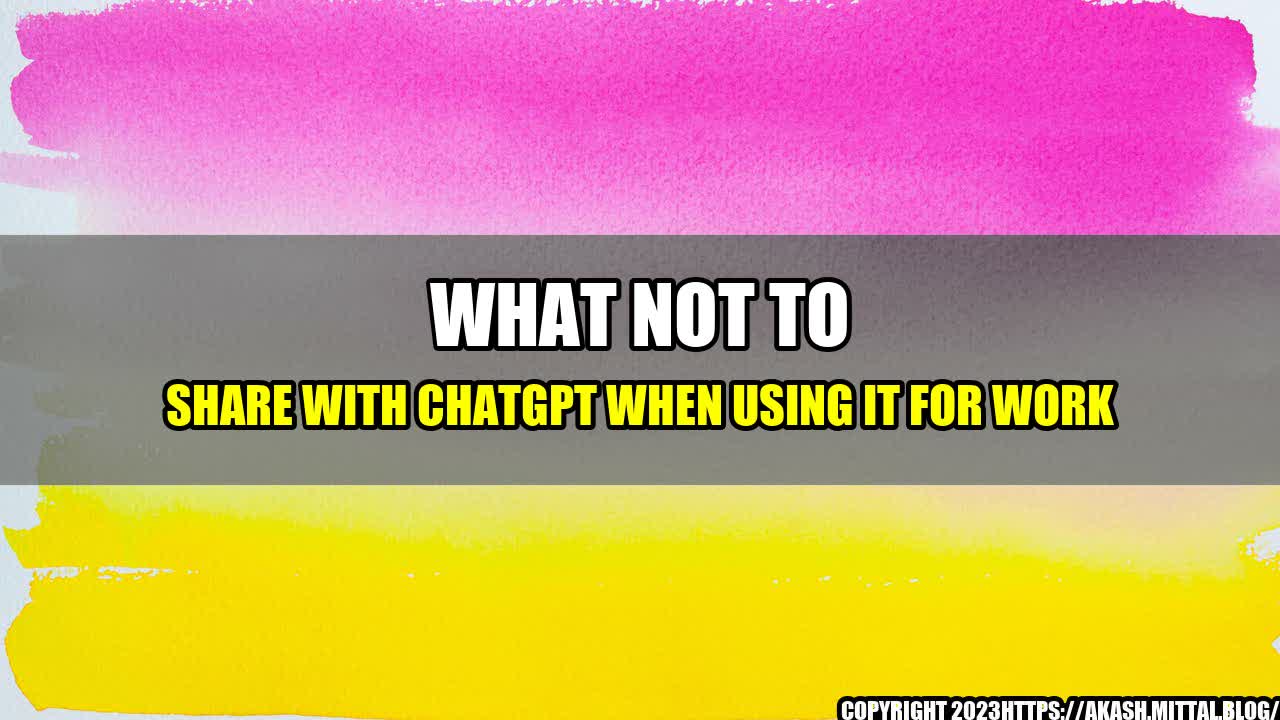Imagine you are at your workplace, trying to complete an important project. Your boss sends you a message on ChatGPT asking for updates. You reply back, sharing how difficult it has been to work with your colleague, and how they seem incompetent. A few hours later, your boss confronts you in person, with a printout of your ChatGPT conversation. You realize that your careless remark has cost you your job.
While this scenario may seem far-fetched, it is not entirely impossible. ChatGPT, like any other messaging platform, can be misused, especially when it comes to office gossip, personal opinions, or sensitive information. Here are some examples of what not to share with ChatGPT when using it for work:
- Your boss's weaknesses or flaws
- Your colleague's negative traits or behavior
- Your salary or compensation package
- Your vacation plans or sick leaves
- Your company's confidential or private information
- Your personal or intimate details
These are just a few examples of what not to share on ChatGPT when using it for work. The consequences of such sharing can be severe, ranging from a loss of trust, credibility, or job security, to legal or ethical violations. Therefore, it is crucial to be mindful of your messages, and to follow some best practices when using ChatGPT in the workplace.
Best Practices for Using ChatGPT in the Workplace
Here are some tips and tricks to help you use ChatGPT more effectively and responsibly in your work environment:
- Use ChatGPT for work-related conversation only. Avoid using it for personal or social communication, unless permitted or necessary.
- Use clear and concise language to convey your messages. Avoid using jargon, slang, or ambiguous expressions that may be misunderstood by your colleagues or clients.
- Double-check your messages for typos, errors, or tone problems before sending them. Use proper punctuation, capitalization, and grammar to enhance your professionalism and credibility.
- Avoid sending messages when you are angry, frustrated, or emotional. Take a break, cool down, and come back to your message later to avoid saying or doing something you might regret.
- Be respectful and polite to your colleagues and clients, even if you disagree with them. Avoid using derogatory or offensive language, or making personal attacks that may harm your reputation.
- Be mindful of your chat history and archives. Delete or hide any messages that are inappropriate or irrelevant to your work, to avoid accidental leaks or evidence against you in the future.
By following these best practices, you can not only avoid making costly mistakes but also enhance your communication skills and professionalism in the workplace. Remember, ChatGPT can be a powerful tool for collaboration, creativity, and productivity, but only if used responsibly and effectively.
Conclusion: Don't Be a ChatGPT Liability, Be a ChatGPT Asset
In summary, ChatGPT can be a double-edged sword when it comes to work-related messaging. It can either boost your productivity, efficiency, and creativity, or jeopardize your reputation, credibility, and career. Therefore, it is essential to remember the following three points:
- What not to share on ChatGPT when using it for work: personal, negative, confidential, or sensitive information
- Best practices for using ChatGPT in the workplace: be professional, concise, respectful, and mindful of your chat history and archives
- How to be a ChatGPT asset, not a ChatGPT liability: use ChatGPT wisely, creatively, and responsibly, to enhance your work experience and reputation, not damage them.
By following these guidelines and using your common sense, you can become a ChatGPT pro and a valuable asset to your team, company, and clients. Good luck!
"I still remember the day when I accidentally shared my medical records on ChatGPT, thinking I was sending them to my doctor. It turned out I had clicked the wrong button and sent them to my project manager instead. The next day, I was called into the HR office, and asked to explain my actions. Needless to say, it was a painful lesson, but it taught me the importance of double-checking my messages, and treating ChatGPT as a professional tool, not a personal toy."
"Last year, a small marketing agency lost its two major clients due to a ChatGPT leak. One of their employees had mistakenly shared a confidential draft of a new campaign with a competitor, instead of their colleague. The competitor took advantage of this mistake and stole the campaign idea, and presented it to the clients, claiming it was their original work. The clients were furious and terminated their contracts with the agency. The moral of this story is that even small mistakes on ChatGPT can have big consequences, and can cost you your business."


Curated by Team Akash.Mittal.Blog
Share on Twitter Share on LinkedIn